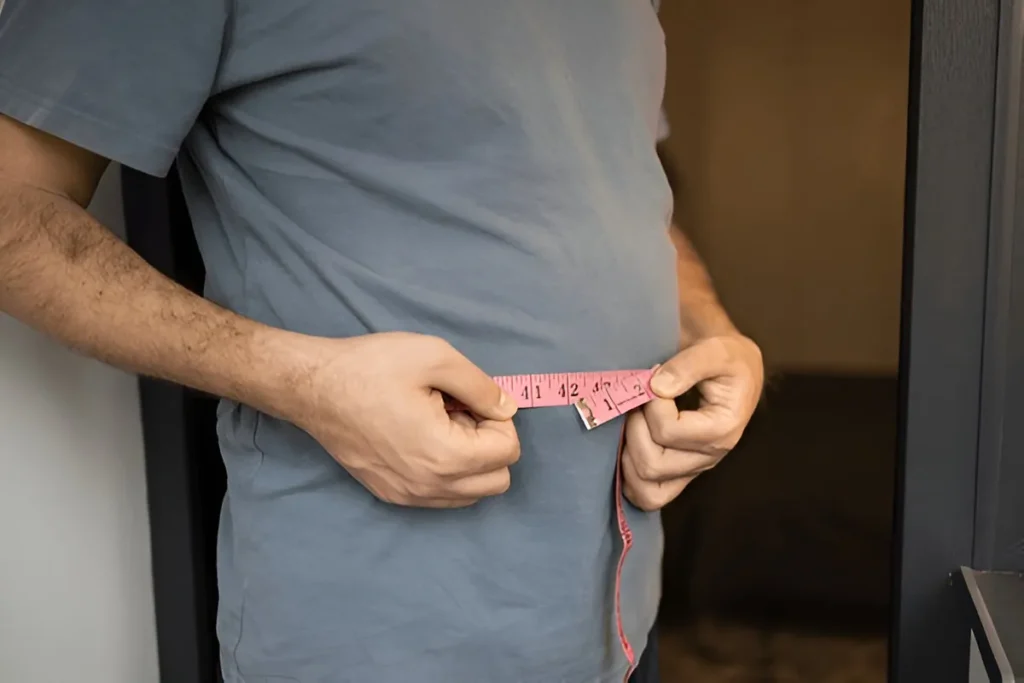- Tirzepatide
- July 16, 2025

What Are the Common Side Effects of Oral Tirzepatide?
Oral Tirzepatide is an emerging medicine for weight loss and type 2 diabetes management. It is not the only solution for weight loss, but a quick and safe option with an appropriate diet and exercise. Many doctors recommend this medicine when patients do not want injectable Tirzepatide or when patients have tried to lose weight for years. Is it completely safe or have side effects like other medicines? Let us check the article below.
In this article, we will explain the common side effects of oral Tirzepatide. We will also touch on key risk factors, practical tips for managing side effects, and why consulting a trusted provider, like ClickSlim, is important for patient safety.
What is Oral Tirzepatide?
Tirzepatide is a drug that contains mainly two hormones, GLP-1 (glucagon-like peptide-1) and GIP (glucose-dependent insulinotropic polypeptide). These hormones activate the receptors and balance the insulin and glucagon in the blood. Thus, this drug reduces appetite and delays gastric emptying.
The oral form of this drug is easy to take for the patients, so it is a highly emerging medicine for weight loss. However, like all medications, common side effects of oral tirzepatide also exist, most of which relate to its effect on the gastrointestinal (GI) system and metabolic processes.
Common Side Effects of Oral Tirzepatide

Tirzepatide does not have specific side effects unless you are allergic to specific ingredients. Some common side effects of oral Tirzepatide are as follows:
Nausea
Nausea is the most common side effect that has been seen. According to FDA trials, 20–30% people experience mild to moderate nausea, especially during the initial weeks of treatment or when the dosage increases. Usually, nausea results from delayed gastric emptying, which is a natural effect of incretin-based medicines. In this case, you should take a lower dose or do not increase the dose of medicine.
Vomiting
After continuous nausea, vomiting can occur if oral tirzepatide does not suit you. According to FDA trials, 5–10% of patients experience mild to moderate vomiting after taking this drug. Usually, vomiting happens when patients take a high dose of medicine or hormones that do not suit their bodies. If you experience persistent or severe vomiting, you should consult your doctor instantly. You can face dehydration and electrolyte imbalance as a complication of this vomiting.
Appetite Suppression
We cannot say that appetite suppression is a side effect of oral Tirzepatide because it is the role of this medicine. Sometimes, it can lead to severe appetite suppression for food, which can lead to a reduced interest even in healthy and balanced food. Excessive appetite suppression can lead to nutritional deficiency. That is why you should also monitor the nutrients of your diet carefully. If you feel a loss of interest in food for a long time, consult your nutritionist or stop taking the medicine.
Constipation
Constipation is a common side effect of many medicines, including oral Tirzepatide. According to FDA trials, 5–15% face constipation issues after taking the drug. It can happen because Tirzepatide reduces bowel movement frequency, leading to constipation. In weight loss, many patients face these issues because of eating less food. That is why eat fibre-rich meals and stay hydrated when you are taking Tirzepatide for weight loss.
Less Common But Notable Side Effects
In addition to the common side effects of oral Tirzepatide, there are some less common but notable side effects. You should also know these effects so that you do not harm your metabolism.
- Diarrhea
- Indigestion or heartburn
- Fatigue or weakness
- Headaches
These symptoms are seen as mild in patients. These occur only in a few patients and at the start of the dose. These effects are usually manageable and subside with continued use. However, you should report to your doctor or consultant who recommended this medicine to you if you get any of the above symptoms.
Risk Factors and Patient Safety
Not all patients get side effects from oral Tirzepatide. They occur in specific conditions and specific patients. That is why you should know the risk factors to rule out whether you are sensitive to this medicine or not.
Here, we have some risk factors that can increase the likelihood or severity of oral tirzepatide:
- Higher doses or rapid dose escalation
- History of GI disorders (e.g., gastroparesis)
- Concurrent medications that affect digestion or metabolism
- Older age or frailty
As a healthcare provider or nutritionist, patient safety should be your priority when you are recommending tirzepatide for weight loss. You should use detailed patient history and lab results to assess candidate eligibility overview and then adjust dosing. Also, the FDA recommends regular monitoring during treatment, especially during the first months.
FDA Trials and Real-World Data
The safety profile of oral tirzepatide comes from clinical trials of the FDA and post-marketing surveys. These trials showed that gastrointestinal side effects are common, but serious adverse effects are relatively rare.
Some FDA trials also looked at pancreatitis and thyroid C-cell tumours as potential concerns. So far, evidence does not suggest a significant increase in these risks in humans, but ongoing research and long-term data are still being collected. Patients should be educated on warning signs like severe abdominal pain or neck swelling.
Practical Tips to Manage Side Effects

Facing mild side effects after taking the trizpeatide first dose? Firstly, you should consult your doctor and avoid the DIY tips to manage side effects. Still, you cannot go to the doctor urgently, but we can provide practical tips to manage side effects.
Some practical tips to manage the side effects of oral tirzepatide are as follows:
- Start low and go slow: Begin with the lowest effective dose and increase gradually.
- Eat smaller meals: Large meals can worsen nausea and vomiting.
- Stay hydrated: Especially important if experiencing nausea, vomiting, and constipation.
- Include dietary fiber: They will manage constipation.
- Track symptoms: Keeping a diary can help identify triggers or patterns.
- Consult doctor: Don’t stop or adjust medication without professional advice.
The Role of ClickSlim in Patient Support
Now, managing the side effects of oral tirzepatide doesn’t have to be overwhelming because we will suggest a trusted spot in this regard. ClickSlim is an expert telehealth clinic specializing in weight management programs. It combines clinical oversight with patient education to help clients achieve safe and effective results.
With ClickSlim, patients receive:
- Personalized dosing plans
- Ongoing monitoring and check-ins
- Nutritional guidance to counteract side effects
- Support from clinicians experienced in incretin-based drugs
At ClickSlim, this holistic approach improves patient safety and treatment outcomes.
Conclusion
The side effects of oral tirzepatide are mostly gastrointestinal, including nausea, vomiting, appetite suppression, and constipation. These effects can be uncomfortable, but they are generally manageable with careful dose adjustment, lifestyle changes, and clinical support.
The benefits of oral tirzepatide, improved blood sugar control and substantial weight loss, outweigh these side effects for many patients, especially under professional supervision. By staying informed, communicating openly with healthcare providers, and partnering with services like ClickSlim, patients can make the most of this innovative treatment while prioritizing patient safety.
If you’re considering oral tirzepatide, speak to a qualified clinician from ClickSlim to discuss whether it’s right for you and to learn strategies for minimizing side effects.

Have Any Question?
We’re here to help—reach out anytime with your questions or concerns!






